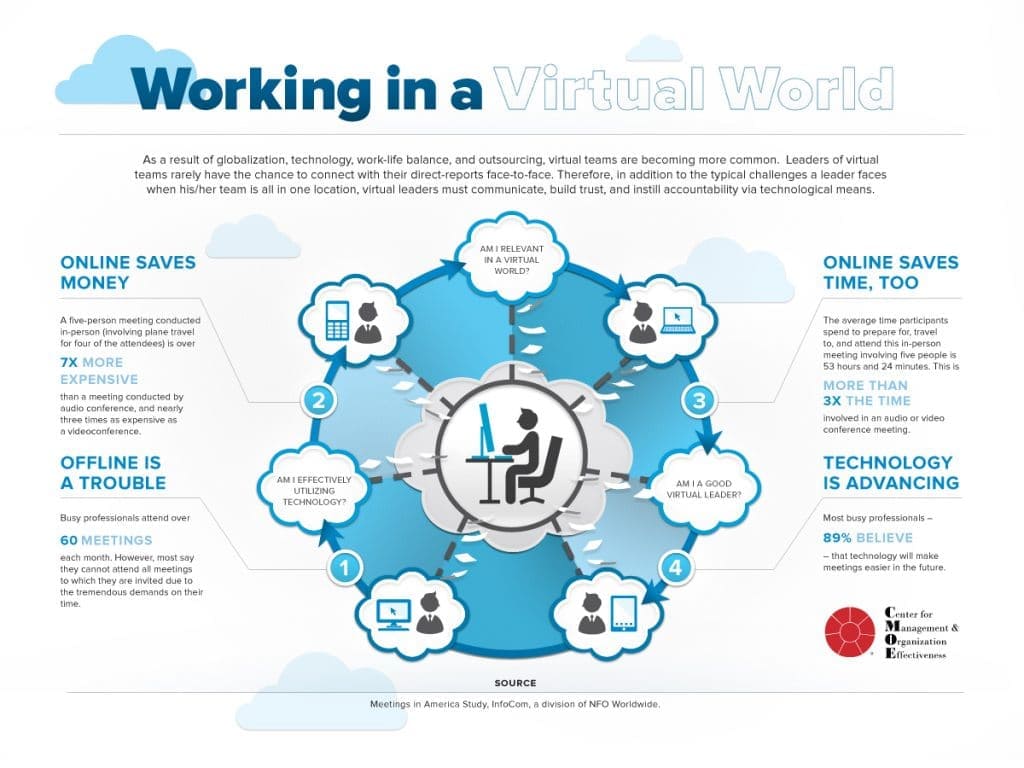Remote work arrangements are on the rise because virtual employees are happier, more productive, and have more positive mental health. Businesses also benefit from work-from-home schemes, ensuring productivity while scaling down costs.
Companies that required their employees to work from home at the height of the COVID pandemic say their workers are happier, more productive, and more collaborative. Because of their newfound freedoms, flexibility, and better life-work balance, 39% of workers are willing to quit their jobs if their employers do not give them opportunities to work away from the office.
That is why seven out of ten businesses now consider adopting a hybrid model – allowing their employees to choose between working remotely and reporting to the office or a combination of both.
Microsoft’s Work Trend Index also underscores the changing focus of corporations, 66% of which are redesigning their work environments to become hybrid work model-friendlier.
Although businesses are now more welcoming of remote workers, HR professionals have a formidable task ahead. They must choose not only the best-fitting candidate for the job but one who is a role model for a virtual work-from-home (WFH) employee. Here are the top ten competencies HR professionals can look for when hiring virtual employees.

Virtual Employees Are With Self-Management Skills
One of the challenges of virtual remote work is time management difficulties. Buffer’s State of Remote Work report states that more than 22% of WFH employees find it challenging to unplug after work. About ten percent of virtual remote workers also complain of distractions in the home getting in the way of their productivity.
Employers and hiring managers must choose work-from-home candidates with excellent self-management skills. These competencies enable people to control thoughts, actions, and feelings, empowering initiative and independence. It includes organization, goal-setting, accountability, time management, self-motivation, and stress management.
Modern business leaders now place a strong emphasis on independent and hardworking self-starters who can manage themselves. After all, no company will want to babysit every employee every time.
According to Market America’s Lesley Walker, self-managing employees are a perfect fit in modern organizations because they have innate self-responsibility and leadership qualities benefiting the business.
HR professionals and job interviewers can phrase their questions to elicit information about the candidate’s self-management behaviors. For example, they can ask the candidate about a particular work situation when he needed help or assistance but could not find any. They can inquire how the person addressed the concern.
Job interviewers can also ask a candidate how he plans to measure and achieve success for a given goal. The candidate’s answer reflects his problem-solving skills, underscoring his ability to create tactical solutions to an abstract goal.
Other potential screening questions can include the following.
- How well do they take feedback and/or criticism?
- How do they intend to address the distractions in the home?
- Do they prefer working individually, or does working with a team better?
- What kind of support do they expect from potential employers to ensure their success in remote work?
Assessing self-management skills in a virtual WFH candidate allows HR professionals to get the best person for a remote work arrangement.
You might also like: Everything You Need to Know About Skills-Based Hiring
Employees on Remote Work Arrangements Have Self-motivation
Forty-eight percent of workers with flexible work arrangements consider their work-life balance excellent, 54% of whom have readily available emotional support at home. Achieving a work-life balance is one of the greatest motivators for employees to do their best.
Unfortunately, the demands of virtual work-from-home projects and activities, coupled with distractions and failure to unplug, can disrupt a person’s sense of work-life balance. Some remote workers find unplugging from their work more challenging than in an office setting where shifts have a definite start and end.
A Forbes article about the common issues plaguing remote workers reveals that work-life unbalance can be a real problem. The line between work and home is blurry at best, increasing the tendency of remote employees to overwork. This observation can dampen their motivation.
Hiring managers, recruiters, and HR professionals must assess the candidate’s self-motivation. Although a component of self-management, self-motivation relies on a person’s inner desire to persevere and never give up. People call it ‘drive,’ while psychologists refer to it as the characteristic force within each person to push through regardless of the odds.
Like assessing a job applicant’s self-management skills, evaluating a candidate’s self-motivation requires framing questions to elicit desirable behaviors from the answers. HR professionals can ask about the candidate’s thoughts about working in different time zones, juggling household chores and work activities, and other circumstances that can upset the work-life balance.
Alternatively, HR professionals can also use different self-motivation questionnaires that measure initiative, commitment, optimism, and personal drive.
Self-Awareness and Grit
Sidney Bruce, a member of the Forbes Human Resource Council, said that self-awareness and grit are the traits they look for in successful remote workers. Self-awareness describes the candidate’s firm grip on his strengths and weaknesses, allowing the person to manage these attributes in the workplace to bring out the best possible results.
Self-awareness goes hand in hand with self-motivation. It allows a person to control his emotions and express them constructively. Self-awareness also empowers people to manage interpersonal relationships empathically and judiciously. A high degree of self-awareness also enables the person to deal with stress better, recognize triggers and stressors, and actively control them to facilitate productivity.
Job interviewers can ask prospective candidates about instances where they used their strengths to overcome a particular problem. They might also want to know of occasions when the person wanted to blame someone but instead reflected on what he did wrong to cause the concern.
Self-awareness is an essential trait of remote workers because these employees face many stresses unfamiliar to office-based workers. Employers must assess the candidate’s readiness to address these issues by relying on their strengths and transforming their weaknesses into positive traits.
Of equal importance is the virtual work-from-home candidate’s grit or perseverance and passion toward an objective, irrespective of distractions and obstacles. It is worth remembering that WFH employees face daily distractions from their families, pets, neighbors, household chores, and other domestic occurrences.
Strong Communication Skills
The National Association of Colleges and Employers reported that 73.4% of business owners and hiring managers rank strong communication skills as the top trait of candidates.
The figure closely resembles the Graduate Management Admission Council’s Corporate Recruiters Survey. It reveals the top four priority traits businesses seek of candidates: oral communication skills, written communication skills, presentation skills, and listening skills.
Communication skills are a must-have for any remote worker. Work-from-home employees are outside company premises, making constant communication challenging if the worker does not have the initiative to keep managers in the loop.
One of the things HR professionals should look for in a virtual WFH employee is intentional communication skills. It describes the candidate’s desire to convey well-thought-out and clear information to team members, leaders, and managers.
It would be best for HR professionals to structure their job interviews to gauge communication skills. Seasoned job interviewers can straightforwardly assess whether a person has excellent communication competencies. Otherwise, they should evaluate the candidate using communication aptitude tests.
Hiring managers should also pay attention to the candidate’s written communication skills. Communicating with a remote workforce often involves emails, chats, and other text-based channels. It would be best to check the job applicant’s ability to convey information professionally, concisely, accurately, and clearly.
Remote team managers will receive email correspondence every day. They will not want gibberish messages after incomprehensible information from virtual WFH employees.
Work Ethic
If work ethic is a must in traditional office settings, this trait takes center stage in remote work. Unfortunately, remote work can pose challenges that undermine productivity, organizational skills, and a sense of professionalism.
Household chores, family responsibilities, and other distractions can make a virtual worker lose focus. Add to this the increasing pressure from the office to deliver, requiring remote workers to finish their tasks within the prescribed period, and communicating almost round-the-clock. These things are a huge burden to a virtual WFH employee.
Employers want their workers to handle professional and personal stresses. It is the only way they can strengthen their determination to succeed. It is the ultimate test of one’s resolve and ability to balance life and work.
It would be best for hiring teams to assess the candidate’s work ethic. They must evaluate the job applicant’s professionalism, productivity, organization, cooperation, teamwork, consistency, determination to succeed, and other factors indicative of high work ethic.
It is equally crucial for HR professionals to convey that work ethic in remote work arrangements is not about constant employee monitoring because of a lack of trust. It is more about building and ensuring dependability, assuring the company that the virtual WFH employee delivers timely expected results.
Unfortunately, candidates tend to lie during an interview to increase their chances of landing the job. A Checkster Research shows that close to four out of five (78%) candidates lie. Sadly, almost two-thirds (66%) of recruiters and hiring managers do not care. HR professionals must use their judgment in assessing the validity and credibility of the job applicant’s answers, especially when gauging work ethic.
Tech Savviness
A person who is barely beginning to surf the internet or unfamiliar with keyboard shortcuts will not be the ideal virtual work-from-home employee. It is also not enough that the candidate knows Microsoft Office and internet surfing because remote work requires more than the typical apps and hardware.
Tech savviness is a crucial skill of excellent remote workers. It describes the person’s knowledge and competence about modern technology, including leveraging such innovations to produce the best possible outcomes for the organization.
Depending on the employer, a remote worker might have to be proficient in different programs. For example, many companies today use GSuite, Zoom, Asana, 15Five, Slack, and other tech tools for remote workers.
Other technologies essential for virtual work include video conferencing solutions, time tracking applications, instant messaging programs, video content management systems, team collaboration suites, project management tools, and more.
There is also hardware and the internet to concern remote employees. Unfortunately, the COVID pandemic slowed down internet traffic. More people in homes use the internet for almost everything, including shopping, work, communication, and social activities.
A New York Times article cited a 30% average increase in internet traffic and a 40% drop in download speeds in May 2020. Although internet service providers continue to accommodate the increasing traffic volume, remote workers must be ready to address the issue of an internet slowdown.
Cybersecurity risks are also increasing. The Identify Theft Resource Center observed more data breaches in 2021 than in 2020.
Cybersecurity Ventures also noted that ransomware attacks occur every two seconds, potentially leading to losses amounting to $265 billion by 2031. Remote workers must also ensure data security in their home computers and other internet devices.
While seasoned remote workers have exceptional tech-savviness, it would still be best for hiring teams to assess candidates’ technical skills. Asking about a technical task during a job interview should weed out the pretenders from the tech geeks.

Adaptability
Modern business owners and managers expect their employees to be resourceful, analytical, and determined, regardless of work challenges and circumstances. Hence, adaptability is a trait many organizations want from their workers.
Although COVID changed the nature of work, workplaces, and organizations, employers know change is continuously evolving. The technologies businesses use today might be obsolete tomorrow. Systems and processes that deliver results might become outdated, requiring new technologies to address emerging concerns. It is crucial to recognize and understand that business organizations need adaptability to manage change effectively.
Virtual work-from-home workers must be adaptable, managing the changes occurring within the organization and the remote work arrangement. Stress will continue to hammer a remote worker’s resolve, putting more pressure on achieving life-work balance.
Hiring teams must assess the candidate’s stress management techniques, perceptions about change, and other measures of adaptability. Job interviewers can pose what-if questions to determine a candidate’s problem-solving skills. They can also challenge what a candidate knows by replacing existing assumptions with new ones.
Personal Accountability
Another trait HR professionals should look for from virtual work-from-home employees is personal accountability. Remote employees often work without the direct supervision and guidance of team leaders.
Unfortunately, some tasks or circumstances require them to act instantly and decisively because consulting with a higher-up will only extend the resolution time. Hence, there are instances when they have to make decisions themselves.
Personal accountability describes a person’s willingness to accept responsibility for any outcomes – good or bad – resulting from one’s actions, behaviors, and choices. It defines the worker’s ownership of situations, never blaming others for what might have gone wrong. Instead, the accountable person strives to correct the mistakes.
Employers must be ready to assess the candidate’s knowledge and understanding of remote work-related roles, responsibilities, tasks, and deliverables. Honesty is also a crucial indicator of personal accountability. Job interviewers can pose hypothetical questions that gauge the applicant’s transparency.
Time management is also essential, ensuring the virtual worker completes the tasks within the prescribed period. Hence, interview questions that focus on the candidate’s time management skills are crucial to gauge personal accountability.
Collaboration
In October 2020, the World Economic Forum cited an increasing trend towards corporate digitalization in its 2020 The Future of Jobs Report. The report also said that remote work would continue to grow, even without COVID. It underscores the need for more efficient collaboration among remote teams and their respective offices.
Unfortunately, remote work also produced collaboration and communication disruptions. A Microsoft study revealed that remote workers tended to increase their collaboration with members who share their values while reducing collaboration times with people they have weak ties with. It produces what experts call siloed work.
Employers, recruiters, and hiring managers should look for virtual work-from-home candidates who can work with everyone in the organization. Effective remote workers can cooperate, communicate, network, and collaborate with people, regardless of beliefs, backgrounds, and other traits.
It would be wise for hiring teams to evaluate the candidate’s discriminatory or prejudicial tendencies that can impact collaboration with all types of people.
Conscientiousness
Companies that observe a hybrid or remote work model expect high-quality results from their virtual work-from-home employees. Hence, the ideal candidate must be responsible, goal-directed, hard-working, and organized. It is also essential that the job applicant display behaviors that highlight adherence to rules and norms.
Hiring managers and professionals can devise interview questions to elicit behaviors that underscore the applicant’s sense of responsibility, reliability, industriousness, and self-control. They can ask instances when the candidate acted impulsively and how such behavior impacted work outcomes and professional relationships.
Recruiters might also want to assess other attributes of conscientiousness. They can evaluate self-discipline, orderliness, self-efficacy, achievement-striving, cautiousness, and dutifulness. HR professionals might want to develop measurement tools to gauge these attributes before deciding to hire a candidate or not.

Final Thoughts on Remote Work Arrangements and Virtual Employees
Choosing the right candidate for the job is never easy in the traditional sense. Hiring a qualified candidate for a virtual work-from-home position can be a hit-or-miss because hiring managers often do not meet the candidate in person. That is why HR professionals must structure their recruitment and hiring processes to include a thorough assessment of the ideal competencies they expect from a work-from-home employee for remote work arrangements.
